一般现在时和现在进行时知识点
六年级重点知识点梳理现在进行时与一般现在时的用法与区别
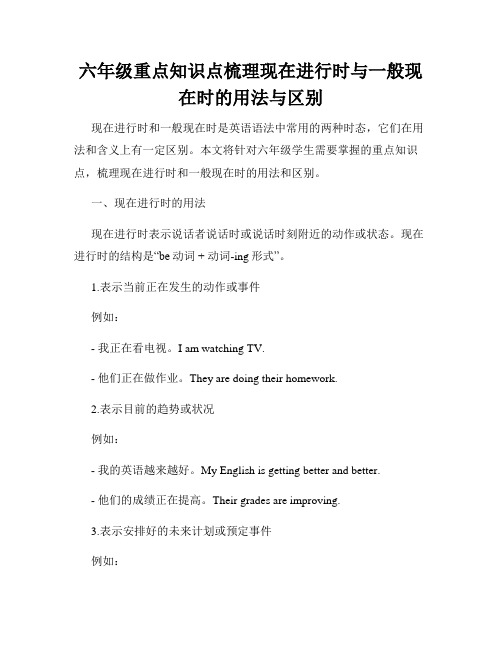
六年级重点知识点梳理现在进行时与一般现在时的用法与区别现在进行时和一般现在时是英语语法中常用的两种时态,它们在用法和含义上有一定区别。
本文将针对六年级学生需要掌握的重点知识点,梳理现在进行时和一般现在时的用法和区别。
一、现在进行时的用法现在进行时表示说话者说话时或说话时刻附近的动作或状态。
现在进行时的结构是“be动词 + 动词-ing形式”。
1.表示当前正在发生的动作或事件例如:- 我正在看电视。
I am watching TV.- 他们正在做作业。
They are doing their homework.2.表示目前的趋势或状况例如:- 我的英语越来越好。
My English is getting better and better.- 他们的成绩正在提高。
Their grades are improving.3.表示安排好的未来计划或预定事件例如:- 我们明天这个时间正坐飞机。
We are flying at this time tomorrow.- 明天下午我将去看电影。
I am going to watch a movie tomorrow afternoon.二、一般现在时的用法一般现在时表示经常性或习惯性的动作、真理或常识。
一般现在时的结构是直接使用动词原形。
1.表示经常性或习惯性的动作例如:- 每天早上我都去晨跑。
I go for a morning run every day.- 她通常在晚上喝茶。
She usually drinks tea in the evening.2.表示客观事实或普遍真理例如:- 鱼生活在水里。
Fish live in water.- 地球围绕太阳旋转。
The Earth revolves around the Sun.3.表示当前状态或性质例如:- 我们学校很大。
Our school is big.- 这个书包是红色的。
This backpack is red.三、现在进行时与一般现在时的区别1.时间范围不同:- 现在进行时强调的是说话时刻附近的动作或状态,具有时间限制。
英语时态基本句型结构与用法知识点总结
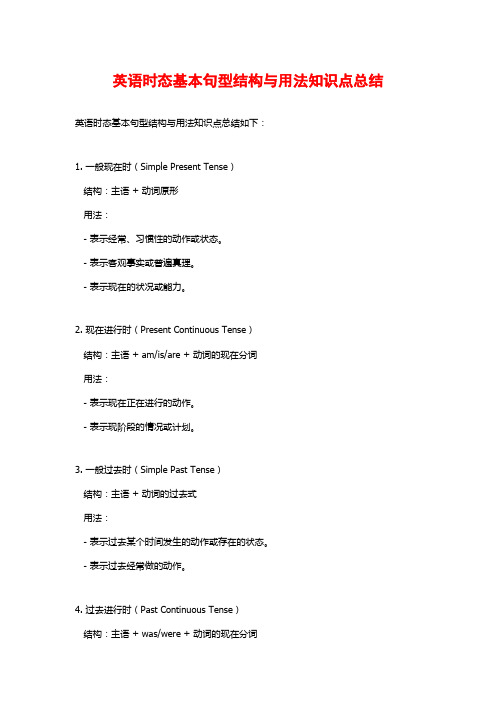
英语时态基本句型结构与用法知识点总结英语时态基本句型结构与用法知识点总结如下:1. 一般现在时(Simple Present Tense)结构:主语 + 动词原形用法:- 表示经常、习惯性的动作或状态。
- 表示客观事实或普遍真理。
- 表示现在的状况或能力。
2. 现在进行时(Present Continuous Tense)结构:主语 + am/is/are + 动词的现在分词用法:- 表示现在正在进行的动作。
- 表示现阶段的情况或计划。
3. 一般过去时(Simple Past Tense)结构:主语 + 动词的过去式用法:- 表示过去某个时间发生的动作或存在的状态。
- 表示过去经常做的动作。
4. 过去进行时(Past Continuous Tense)结构:主语 + was/were + 动词的现在分词用法:- 表示过去某个时间段内正在进行的动作。
5. 一般将来时(Simple Future Tense)结构:主语 + will/shall + 动词原形用法:- 表示将来某个时间或情况下会发生的动作。
6. 将来进行时(Future Continuous Tense)结构:主语 + will/shall be + 动词的现在分词用法:- 表示将来某个时间段内正在进行的动作。
7. 过去将来时(Future-in-the-Past Tense)结构:主语 + would/should + 动词原形用法:- 表示过去某个时间点的未来动作或情况。
8. 完成时态(Perfect Tenses)结构:have/has/had + 动词过去分词用法:- 表示过去某个时间点之前已经完成的动作。
- 表示过去某个时间点之前已经发生的或持续到现在的状态。
9. 过去完成进行时(Past Perfect Continuous Tense)结构:had + been + 动词的现在分词用法:- 表示过去某个时间点之前一直在进行的动作。
一般现在时和现在进行时最全知识点
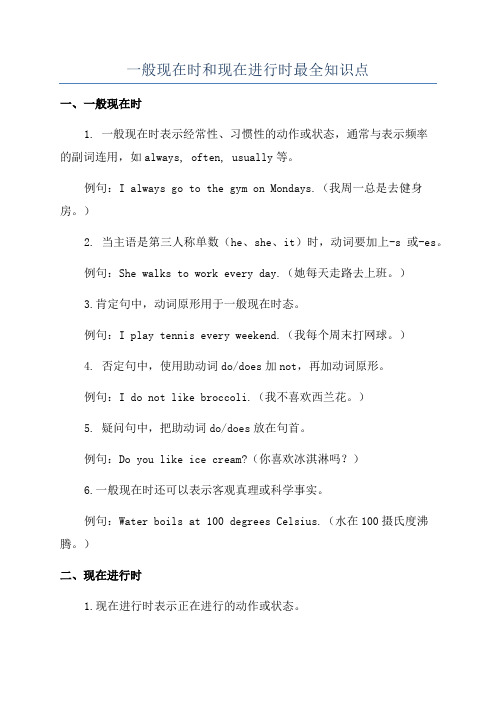
一般现在时和现在进行时最全知识点一、一般现在时1. 一般现在时表示经常性、习惯性的动作或状态,通常与表示频率的副词连用,如always, often, usually等。
例句:I always go to the gym on Mondays.(我周一总是去健身房。
)2. 当主语是第三人称单数(he、she、it)时,动词要加上-s或-es。
例句:She walks to work every day.(她每天走路去上班。
)3.肯定句中,动词原形用于一般现在时态。
例句:I play tennis every weekend.(我每个周末打网球。
)4. 否定句中,使用助动词do/does加not,再加动词原形。
例句:I do not like broccoli.(我不喜欢西兰花。
)5. 疑问句中,把助动词do/does放在句首。
例句:Do you like ice cream?(你喜欢冰淇淋吗?)6.一般现在时还可以表示客观真理或科学事实。
例句:Water boils at 100 degrees Celsius.(水在100摄氏度沸腾。
)二、现在进行时1.现在进行时表示正在进行的动作或状态。
例句:I am studying for my exams.(我正在备考。
)2. 现在进行时通常由be动词(am/is/are)和动词的现在分词形式(-ing形式)构成。
例句:He is reading a book.(他正在看书。
)3. 当主语是第三人称单数时,动词be要相应变成is。
例句:The dog is barking.(狗在叫。
4.现在进行时可以用来描述计划或安排将来要发生的事情。
例句:I am meeting my friends for lunch tomorrow.(我明天要和朋友们一起吃午饭。
)5. 否定句在be动词后加not。
例句:They are not watching TV.(他们不在看电视。
现在进行时和一般现在时

• 第三人称单数形式的变化规律:
• a:一般在动词后加s,sit-sits, • b:以ch/sh等结尾的,加 es,teach-teaches. • c,以辅音字母+y的,把y改成 i+es.study-studies.
• .Grammer
• Using the Present Continuous Tense(使用现在进行时) • 1。现在进行时表示现在(说话瞬间)正在进 行或发生的动作). • 2。谓语结构:be (am ,is ,are )+doing • 3。否定式:be (am ,is ,are )+not +doing 疑问式:Be (Am ,Is ,Are)+主+doing
What are they doing?
They are looking at the meat.
• • • • • •
1.Jim has (have) a nice pen. 2.The students are doing (do) homework. 3.Listen,who is singing (sing). 4.We often clean (clean) after class. 5.Look,she is running (run). 6.He goes (go) on weekends.
•What are they doing? •They are singing. •Are they singing ?
•Yes, they are. (No , they are not)
•They are not singing.
.动词-ing形式的构成
一般在动词原 形后+ing
以不发音的e 结尾的,去e, +ing
小学六年重要知识点现在进行时与一般现在时的区别
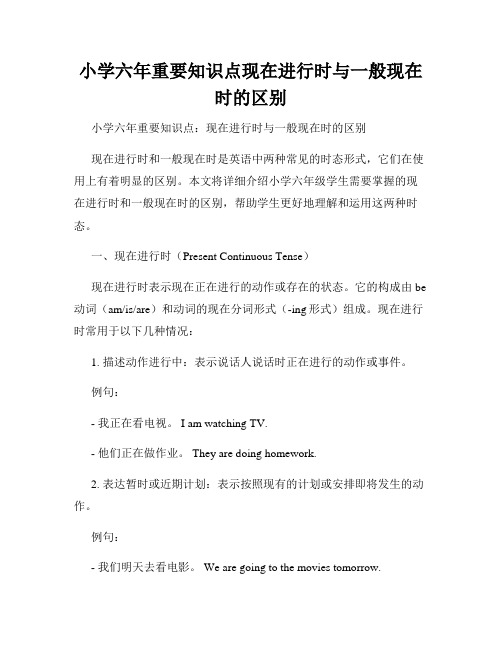
小学六年重要知识点现在进行时与一般现在时的区别小学六年重要知识点:现在进行时与一般现在时的区别现在进行时和一般现在时是英语中两种常见的时态形式,它们在使用上有着明显的区别。
本文将详细介绍小学六年级学生需要掌握的现在进行时和一般现在时的区别,帮助学生更好地理解和运用这两种时态。
一、现在进行时(Present Continuous Tense)现在进行时表示现在正在进行的动作或存在的状态。
它的构成由be 动词(am/is/are)和动词的现在分词形式(-ing形式)组成。
现在进行时常用于以下几种情况:1. 描述动作进行中:表示说话人说话时正在进行的动作或事件。
例句:- 我正在看电视。
I am watching TV.- 他们正在做作业。
They are doing homework.2. 表达暂时或近期计划:表示按照现有的计划或安排即将发生的动作。
例句:- 我们明天去看电影。
We are going to the movies tomorrow.- 他们这个星期末将去游泳。
They are going swimming this weekend.3. 表示不断重复的动作:表示说话人批评或抱怨某人经常做的或让人不悦的事情。
例句:- 你为什么总是迟到?- Why are you always late?二、一般现在时(Simple Present Tense)一般现在时表示经常发生的动作、客观事实、普遍真理或经常存在的状态。
它的构成形式一般由动词原形(第三人称单数时加-s)来表示。
一般现在时常用于以下几种情况:1. 表达经常性动作:表示日常生活中经常或习惯性发生的动作。
例句:- 我们每天早上六点起床。
We get up at six every morning.- 她总是在学校图书馆看书。
She always reads books in the school library.2. 陈述客观事实:表示客观存在的事实、真理或科学事实。
动词的一般现在时态和动词的现在进行时态
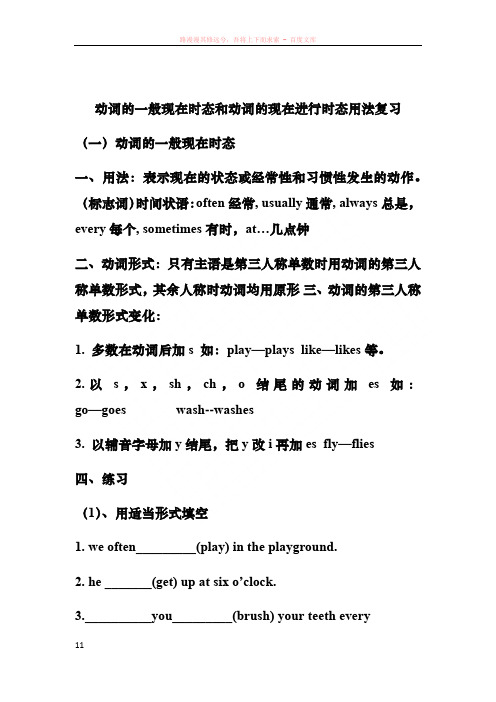
动词的一般现在时态和动词的现在进行时态用法复习(一)动词的一般现在时态一、用法:表示现在的状态或经常性和习惯性发生的动作。
(标志词)时间状语:often经常,usually通常,always总是,every每个,sometimes有时,at…几点钟二、动词形式:只有主语是第三人称单数时用动词的第三人称单数形式,其余人称时动词均用原形三、动词的第三人称单数形式变化:1. 多数在动词后加s如:play—plays like—likes等。
2.以s,x,sh,ch,o结尾的动词加es如:go—goes wash--washes3. 以辅音字母加y结尾,把y改i再加es fly—flies四、练习(1)、用适当形式填空1.we often_________(play)in the playground.2.he_______(get)up at six o’clock.3.__________you_________(brush)your teeth everymorning?4.what(do)he usually(do)after school?5.nick_______(not go)to the zoo on Sunday.6. she_______(go)to school from Monday to Friday.7.at eight at night,she__________(watch)TV with his parents.8. ________mike________(read)English every day?2、写出下列动词的第三人称单数drink______go_____stay_____make______look____ have_____pass____carry____come_______watch_____ plant_______fly________study_______brush________do_________teach_______(二)动词的现在进行时态一、定义:现在进行时表示现在或当前一般时间正在进行的动作。
小学重要知识点总结现在进行时和一般现在时的学习与应用
小学重要知识点总结现在进行时和一般现在时的学习与应用现在进行时和一般现在时是小学英语中的两个重要的时态。
本文将对现在进行时和一般现在时的学习与应用进行总结。
一、现在进行时(Present Continuous Tense)现在进行时表示现在正在进行的动作或状态。
它的主要结构是“助动词be(am/is/are)+现在分词”,其中助动词的形式要根据主语的人称和数的不同变化。
1. 现在进行时的构成:肯定句:主语 + am/is/are + 现在分词否定句:主语 + am/is/are + not + 现在分词疑问句:Am/Is/Are + 主语 + 现在分词?2. 现在进行时的用法:(1)表示目前正在进行的动作或状态:例句:He is playing basketball now.(他正在打篮球。
)(2)表示现阶段正在发生的变化:例句:The weather is getting colder.(天气正在变冷。
)(3)表示安排好的、即将发生的动作:例句:I am meeting my friend tomorrow.(我明天将要见我的朋友。
)3. 现在进行时的时间状语:现在进行时通常与时间状语连用,常见的有:now(现在)、at the moment(此刻)、today(今天)、this week(本周)、at present(目前)等。
二、一般现在时(Simple Present Tense)一般现在时用来描述客观事实、经常性的动作或习惯,以及表达真理等。
一般现在时的动词在第三人称单数时要加上“-s”。
1. 一般现在时的构成:肯定句:主语 + 动词原形(第三人称单数要加-s)否定句:主语 + do/does + not + 动词原形疑问句:Do/Does + 主语 + 动词原形?2. 一般现在时的用法:(1)表达客观事实或普遍真理:例句:The earth revolves around the sun.(地球绕着太阳转。
一般现在时和现在进行时
一般现在时和现在进行时一、基本用法不同【1】一般现在时用来表示习惯性的动作或状态。
如:She goes to school by bike every day.她每天骑自行车去上学。
【2】现在进行时用来表示现在(说话的瞬间)正在发生或进行的动作或者用来表示现阶段正在进行或存在的状态。
如:Look ! She is reading under the tree.瞧!她正在树下看书。
二、谓语动词的形式不同【1】一般现在时的谓语动词:1) be动词用am/is/are这三种形式;2)实义动词用动词原形或第三人称单数形式(根据主语数的变化而变化)。
如:We go to school at seven in the morning.我们早晨七点钟上学。
【2】现在进行时谓语动词的形式为:am / is / are+动词-ing 形式。
I am reading English now. 我现在正在读英语。
三、时间状语不同【1】一般现在时常与often, sometimes, always, usually等频率副词及once a week/day等频率短语连用,还与every morning /day / week..., on Wednesday, in the morning / afternoon / evening等时间状语连用。
【2】现在进行时常与now, these days, these weeks等时间状语连用。
句首有Look ! / Listen !等提示语时,后面的句子中动词一般用现在进行时。
四、特殊用法1. 一般现在时的特殊用法:表示客观真理、自然现象往往要用一般现在时表示。
如:The moon goes round the earth.月亮绕着地球转。
2. 现在进行时的特殊用法:现在进行时与always 连用时,往往含有赞扬、厌恶、责备等感情色彩。
如:He is always working hard.他总是非常努力地工作。
一般现在时和现在进行时
一般现在时1.一般现在时的定义:一般现在时是描述现在或经常性的性质,动作或状态的时态。
常与表示频度的时间状语every day, usually, always, often, sometimes, on Sunday等连用。
如:We usually go to school at 7:30. 我们通常7:30上学去。
[go]2.一般现在时的结构及句型变化构成:一般现在时的构成主要有两种形式:(1)对于谓语动词或助动词是be、have、can/may/musta.肯定句中I am a student.I can swim.b.否定句中,谓语动词或助动词是be、have或者情态动词can/may/must 等,在将be动词,助动词,情态动词后加not.She isn't a teacher.她不是教师。
I can’t swim.c.一般疑问句,.对于谓语动词或助动词是be、have或者情态动词can/may/must 等,将be动词,助动词,情态动词移到主语前面,句尾用问号Are you ready?Yes,I am.No,I'm not.Can you swim? Yes, I can. No, I can’t.(2)实义动词型:句中的谓语动词为实义动词(也叫行为动词):a.肯定句中,只出现实义动词,如:I get up in the morning.我早晨起床。
b.否定句中,要在实义动词前面加do(does)+not,do(does)作助动词,本身无意义,常与not缩写成don't(doesn't),如:I don't like vegetables.我不喜欢蔬菜。
c.一般疑问句,要在句子开头加助动词Do(does),句尾用问号,简略答语用Yes,主语+do(does).或No,主语+do(does)+not.如:Do you like oranges?—你喜欢桔子吗?Yes,I do.—是的,我喜欢。
六年级四大时态知识点归纳总结
六年级四大时态知识点归纳总结英语六年级四大时态知识点归纳总结简介:英语六年级时态是学习英语语法中的重要部分,掌握好时态的用法对于学习英语有着至关重要的作用。
本文将对六年级学生需要掌握的四大时态进行总结和归纳,旨在帮助同学们更好地理解和运用这些知识点。
一、一般现在时1. 表示经常性、习惯性或普遍真理的动作或状态。
例句:I play soccer every Sunday.(我每个星期天踢足球。
)2. 用于第三人称单数,动词需加s。
例句:He goes to school by bus.(他乘公交车去学校。
)3. 特殊疑问句中动词放在句首,而一般疑问句中用助动词do或does。
例句:Where do you live?(你住在哪里?)Does she like ice cream?(她喜欢冰淇淋吗?)4. 否定形式在动词前加don't或doesn't。
例句:I don't like broccoli.(我不喜欢花椰菜。
)He doesn't play the guitar.(他不弹吉他。
)二、一般过去时1. 表示过去某个时间发生的动作或状态。
例句:I watched a movie yesterday.(我昨天看了一部电影。
)2. 动词过去式一般在动词后加-ed,但也有一些不规则动词。
例句:She ate an apple for breakfast.(她吃了一个苹果作早餐。
)3. 特殊疑问句和一般疑问句中用助动词did。
例句:What did you do yesterday?(昨天你做了什么?)Did they go to the park?(他们去公园了吗?)4. 否定形式在动词前加didn't。
例句:I didn't swim in the lake.(我没有在湖中游泳。
)They didn't finish their homework.(他们没有完成作业。
- 1、下载文档前请自行甄别文档内容的完整性,平台不提供额外的编辑、内容补充、找答案等附加服务。
- 2、"仅部分预览"的文档,不可在线预览部分如存在完整性等问题,可反馈申请退款(可完整预览的文档不适用该条件!)。
- 3、如文档侵犯您的权益,请联系客服反馈,我们会尽快为您处理(人工客服工作时间:9:00-18:30)。
一般现在时一般现在时第一节——基本知识一般现在时表示经常重复性的动作或是存在的状态。
例如:他喜欢睡觉。
He likes sleeping. I’m a teacher.(状态)我经常在周末去看望祖父母。
I often go to see my grandparents at the weekend.(重复性的动作)标志词:always usually often sometimes never everyday everyweek at+时间on+Sundays(解释at+时间——at five o’clock at a quarter past seven等表示具体的几点几分解释on+Sundays——on加表示星期的单词包括Monday Tuesday等)标志词的作用:1.做题时,帮助孩子迅速确定这句话的时态,填入相应的动词形式2.初期学习,标志词是可以准确对应时态的,但是随着知识的加深,一个标志词变不只代表这一种时态,这时候,就需要把标志词这个拐杖扔掉了。
所以标志词的学习,就是让孩子有时态的意识,并熟知各大时态动词的形式,乃至以后,这句话中没有标志词了,孩子也会正确表达出符合此句话意境(时态)的句子。
一般现在时动词形式:1.be原形 am is areYou are a boy. I am a thin girl. The Whites are at the beach. He is collecting shells.2.动词原形及单三Sally usually does(单三) her homework in her bedroom.We have(原形)dinner together.什么是单三?单三就是人称的第三人称单数。
如果人称是单三,那么动词也得跟着变单三。
判断方法除了I和you这两个单词之外的所有单数意义的词 I you单数复数(单三)做个小练习——找单三a girl photos a bowl she I hewater it the tree Mary a fat dog theyleaf you leaves we three boys MayTony man men the desk English classa red hat动词变单三记不记得判断出人称是单三了动词也得跟着变单三啊动词变单三的方法和名词变复数是一样的。
一.大部分的单词直接加s 二.以ch shs x结尾的动词加es三.辅音加y改y为ies 四.以o结尾的加es举例:一.直接加s put-puts open--opens dance--dances二.加es watch--watches wash--washes plus--pluses三.辅音加y 改y为ies fly--flies 注意:play--plays(元音加y)四.以o结尾加es do--does go--goes做练习:将下列单词变单三work________________clean_______________write_______________drink_______________stay_______________brush_______________carry_______________pass_______________come_______________plant_______________fly_______________play_______________look_______________have_______________do_______________go_______________现在来试试做一般现在时的练习题:Judy说在前头:1.划标志词 2.记住判断人称是不是单三 3.人称是单三的话,动词得变单三啊!We often __________________(play) in the playgound.He __________________(get) up at six o’clock.Danny __________________(study) English,Chinese,Maths,Science and Art atschool.Mike sometimes __________________(go) to the park with his sister.At eight at night, she __________________(watch) TV with his parents.答案:找单三:a girl photos a bowl she I hewater it the tree Mary a fat dog theyleaf you leaves we three boys MayTony man men the desk English classa red hat做练习:将下列单词变单三work_______s_________clean________s_______write_______s________drink________s_______stay______s_________brush_______es________carry y去掉ies________pass________es_______come______s_________plant______s_________fly y去掉ies_________play_______s________look________s_______have____has____do________es_______go_______es_______ _时态练习We often _____plays_____(play) in the playgound.He ____gets___(get) up at six o’clock.Danny ____studies____(study) English,Chinese,Maths,Science and Art at school.Mike sometimes _____goes____(go) to the park with his sister.At eight at night, she ____watches_______(watch) TV with his parents.一般现在时第二节——句型转换一般疑问句:一提二变三改1.be动词提前2.变——I变you me变you we变you us变有 my变your our变yourI am变Are you3.改——句号改问号例如:We are giving our best wishes to her.Are you giving your best wishes to her?练习:I am doing my homework in the living room._________ ___________doing__________ homework in the living room? We are dancing at the birthday party of Mary’s._______ _________dancing at the birthday party of Mary’s?My father is taking me home._______ ________father taking__________home?Our teacher is talking with us._________ __________teacher talking with_____________?答案:I am doing my homework in the living room.Are you doing your homework in the living room?We are dancing at the birthday party of Mary’s.Are you dancing at the birthday party of Mary’s?My father is taking me home.Is your father taking you home?Our teacher is talking with us.Is your teacher talking with you?一般疑问句:一写二变三改1.动词原形写do 动词单三写does 写完does 动词单三还原2.变——I变you me变you we变you us变有 my变your our变yourI am变Are you3.改——句号改问号例如:1.My mother washes the dishes for our family everyday.Does your mother wash the dishes for your family everyday?2.My family drink milk every morning.Do your family drink milk everyday?练一练1.My mother washes the dishes for our family everyday._________ _________mother________the dishes for________family everyday?2.My family drink milk every morning._______ _______ family_______milk every morning3.They tell me to go to the park at four o’clock in the afternoon._________they__________ ___________to go to the park at four o’clock in the afternoon?4.He tells me to go to the park at four o’clock in the afternoon._________he__________ ___________to go to the park at four o’clock in the afternoon?答案:1.My mother washes the dishes for our family everyday.Does your mother wash the dishes for your family everyday?2.My family drink milk every morning.Do your family drink milk everyday?3.They tell me to go to the park at four o’clock in the afternoon.Do they tell you to go to the park at four o’clock in the afternoon?4.He tells me to go to the park at four o’clock in the afternoon.Does he tell you to go to the park at four o’clock in the afternoon?否定句Be动词后直接加(not)I am not a student.He isn’t collecting shells at the beach.They aren’t watching TV in the living room.(这个很简单孩子都会,就不多讲了)动词原形否定用don’tMy family drink milk every morning.否定:My family don’t drink milk every morning.动词单三否定句用doesn’t 写完doesn’t动词单三还原My mother washes the dishes for our family everyday.My mother doesn’t wash the dishes for our family everyday.练习:1.I have many books.?I_____________ ______________ many books.?2.Gao Shan’s sister likes playing table tennis.Gao Shan’s sister_____________ ______________playing table tennis3.My dog runs fast.My dog_____________ ______________fast.4.Mingming usually waters the flowers every dayMingming usually _____________ ______________ the flowers every day5.Tom does his homework at home.Tom _____________ ______________his homework at home.答案1.don’t have2.doesn’t like3.doesn’t run4.doesn’t water5.doesn’t do现在进行时意义:表示正在进行的动作。
